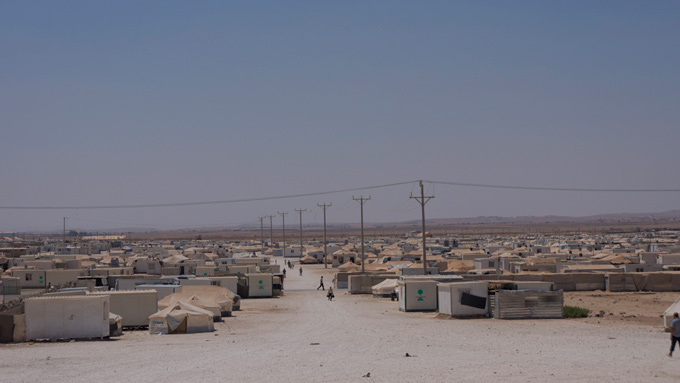
Al-Zaatari refugee camp in Jordan, near the Syrian border. Photo by MTL, August 2013.
The legacy of the 20th century has been to define a stateless person in need as a refugee. In the Middle East, there are millions of such “refugees,” many of whom have lacked a state for 65 years, since the nakba of 1948 that created Israel out of Palestine. The dates of the disasters are written on the walls of the camps: 1948, 1967, 1973. And Israel continues to divide Palestine and its people while its own borders implode. In recent weeks, Eritrean and Sudanese immigrants in the thousands have been occupying public space, demanding that their humanity be recognized, chanting, “We are all refugees; yes to freedom—no to prison!”
Contemporaneously, in the wake of uprisings from Sidi Bouzid to Daraa, the borders that the British government and the League of Nations created for the former provinces of the Ottoman Empire—forging the present states of Israel, Egypt, Syria and Lebanon (and leaving Palestinians stateless)—are breaking down. The Middle East is a microcosm of the demise of Westphalian civilization, showing how nation-states dissolve in the heady crucible of global capital and militarism. So what does it mean to say and hear, “We are all refugees”?
On the Nation-State
Hannah Arendt, in exile from Nazi Germany, influentially described the refugee as a person lacking the rights promised by liberal democratic states—a paradox because those same states denied refugees their human rights in the defense of their own sovereignty. Nations wage war, internally and externally, to the point that militarism has become a constant condition. But are states really sovereign today, when war is not declared and violence flows ceaselessly across borders? Or when governments represent the interests of multinational corporations rather than those of their people? Think of the drones monitoring and bombing people in Yemen and Pakistan, countries against which the United States has never declared war. Consider the debt created by conditions of economic servitude in Greece or Egypt or even the United States.
The Middle East, in particular, poses the quintessential questions of our time: What is a refugee if there is no nation-state? Can refugees really exist as a category if there are no effective governments in control of territory and the mass illusion of real democracy has faded away? Today’s refugee is a person seeking multiple refuges, not only from political violence but also from neoliberalism, a system that erodes every border to create ceaseless capital flows while erecting new walls to separate humans.
Borders are obstacles, but ultimately they are not meaningful: culture, language, food, ideas and politics cross them with ease.
Detroiters refer to the municipal boundaries that enclose their shrinking population as “the border.” People evicted from New Orleans after Hurricane Katrina refused to be called refugees because they insisted that they remained citizens of the United States. When people occupied Wall Street on September 17, 2011, they said they came as refugees from a native dreamland, seeking asylum in the actual. They sought to rediscover and reclaim the world—without the state and without the refugees the state creates. When Superstorm Sandy struck, people saw beyond the state. They declared their own emergency and mobilized supplies and volunteers to collaborate with those whose lives were in danger from hunger, darkness and exposure to the elements. When Palestinian Syrians boarded a boat seeking refuge, they were denied asylum by Malta. Instead they were taken in by the international waters of the Mediterranean while the relatives they left behind continue to experience a brutal siege by the Syrian regime in Yarmouk refugee camp, dying slowly as they are starved, lynched and tortured.
How do we see the person who is displaced by state or economic violence, whether from Syria, Palestine, Sudan, Detroit, Soweto or any other place? In addition to those driven away from their homes by war or poverty, climate disasters and environmental violence are forging new types of displaced people: oil refugees, nuclear refugees, bauxite refugees, water refugees. What name do we give to these emerging states of statelessness? For many years, the politics of the powerless largely centered on creating a state for them. What is the politics of today’s global stateless, left behind by governments at the mercy of corporations that transcend national laws and international treaties?
Perhaps we can say that we are all refugees now, even if we remain citizens, and in that mutual recognition and acceptance lies the power of the powerless. For us, borders are obstacles, but ultimately they are not meaningful: culture, language, food, ideas and politics cross them with ease. This is not a conclusion. It is a beginning.
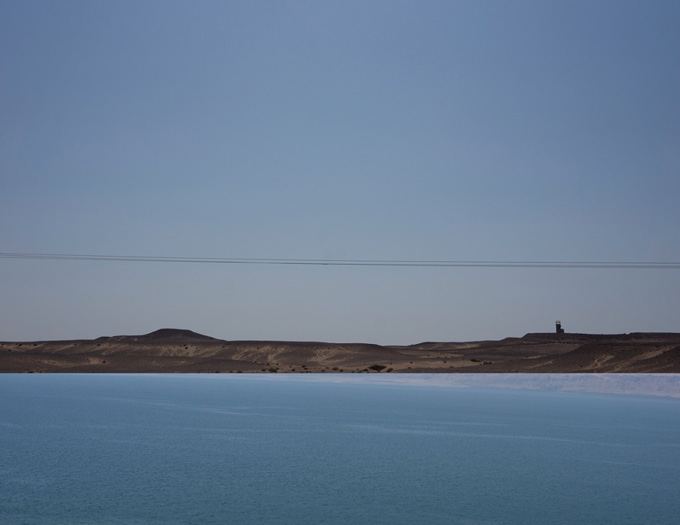
MTL, The Kingdom of Strangers, 2013. “Lead colors the shores of the Dead Sea where I stand. The Jordan Valley sinks down with me into a damp abyss. Humidity, lead and the aroma of memories.”
In Jordan, the Stateless Gather
Jordan seems to have always been a refuge for those displaced in the Middle East. (Indeed Jordanian Bedouins refer to themselves as “original inhabitants” in order to indicate that they, unlike the various refugee populations, have always lived there.) Since 1948 Jordan has been a haven for Palestinians. Its Palestinian camps have become permanent settlements on land leased for 99 years, with satellite dishes and poached electricity, like so many other informal housing locations across the so-called underdeveloped world. And for Iraqis Jordan has served as a temporary home since 1991. More recently, Syrians and Palestinian Syrian refugees are trying to make it across the border. Jordan is the most stable country in the region in their view—and in the estimation of the international NGOs and aid providers that have established regional headquarters in Amman.
Because of the Palestinian refugee, Syrians understand that once you leave your home there is no guarantee of return.
Several months ago we left Palestine for Jordan. We learned that the monarch, King Abdullah II, spends as much time in his London flat as he does in Amman. It’s a fitting connection to those European colonizers Sykes and Picot, who drew up a map of the Middle East in 1916, installing a loyal monarch (the present king’s great-grandfather) and claiming he was related to the Prophet Mohammed. Back in the country that Abdullah II presides over from a distance, we found monumental images of the king and his late father wherever we looked, from the interiors of shops to the exteriors of every other building. More recently, pictures of the king’s 20-year-old son have gone up too. The plethora of images is effective. They become what you talk about—instead of talking about the wars and the refugees.
Ever since hundreds of thousands of Palestinians were driven off their land by the creation of Israel, the power brokers of the region have pointed to Jordan to satisfy the Palestinians’ desire to exercise their right to self-determination and statehood. When the first Gulf War broke out, people spilled over, camped on borders, got smuggled in tankers and pretended to be citizens of other nations. When the second Gulf War erupted, people found Jordan again. Now we see people similarly fleeing Syria. Those who have never been in need of a home are now refugees. Then there are those who, for more than 65 years, have lived in camps that once resembled those now being erected by international NGOs for Syrian refugees.
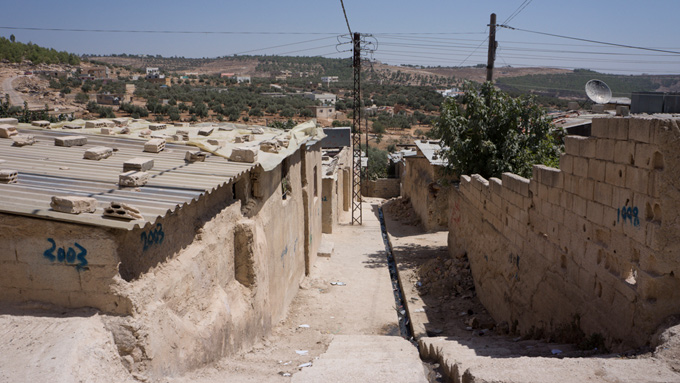
Gaza Refugee Camp, Jerash, Jordan. Photo by MTL, September 2013.
The moment in Jordan is one of mutual recognition of a common plight among Syrians and Palestinians. How often we have come across Syrian refugees who say, “Now we understand what our Palestinian brothers and sisters have gone through.” Because of the Palestinian refugee, Syrians seem to understand that once you leave your home there is no guarantee of return and time takes on a seemingly autonomous nature. It could be tomorrow, theoretically, or you could die never having returned, with new generations facing the trauma of being neither here nor there and having to agonize through the decisions to live and plant roots again or not.
It’s a question of beginning anew, in a different social and economic class, having been demoted by political leaders and elites and those who act as their proxies without power but whose violence also displaces people. Do you leave behind your home and family and relatives, or do you wait, suspended in time and place, because returning, despite time lost, still leaves you in better shape? Life is a gamble that matters. In the meantime some are thinking about who is living in their house.
Things get reshuffled: the same actions undertaken by different subjects. People are glued to TV, watching the news. Two generations ago, Palestinian refugees were told by their Arab brothers and sisters, “You watch TV all the time.” (In fact they still do, wondering if conditions have changed so that they can return.) People ridiculed them. Now Syrians are the ones watching TV, hanging on to every word, every false promise, as if their salvation will ever come from abroad, as if some peace summit in Geneva or elsewhere will bring enough of a stop to hostilities to permit their return, or as if things can ever be the same.
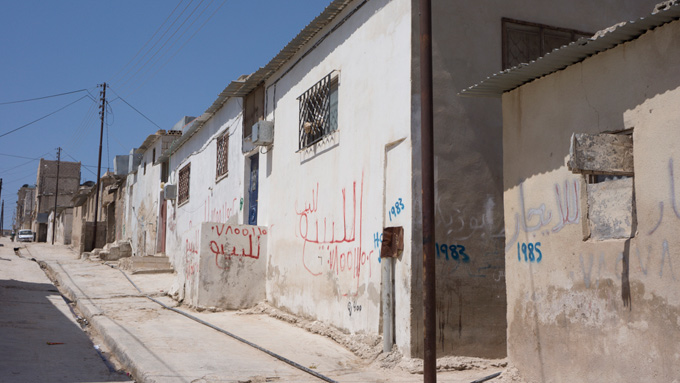
Gaza Refugee Camp, Jerash, Jordan. Photo by MTL, September 2013.
We talked to a Palestinian, a father, about the situation. He lives in Gaza Camp, near the Jordanian city of Jerash. The camp’s residents have no citizenship. They are stateless. He apologized profusely before saying, as he cried, “I wish every Arab would go through what the Syrians are going through, so they can understand what we have gone through and continue to go through. Let them know how it feels to watch the news 24-7 with that false hope—as we learned—that things will change. Let them be the source of ridicule now.”
Earlier, we met Suheir, a third-generation Palestinian refugee living in Amman. Suheir said that there is something about the Syrian refugees that has helped her and her sister understand what happened with their parents and grandparents. Growing up, they had heard the crying every night for what had been lost, for the injustice that had been done. The feeling of helplessness can be paralyzing. You love life, but you cannot live. You love your children, but you cannot part with your loss. Injustice is a curious thing. You may not feel that you are living, but life goes on. The need to work and provide for others and have sex and give birth continue. And so Suheir had come to a conclusion: “It’s a noble cause to want to return to your original country, but we are living here. That’s a fact. We want to protect ourselves as well. The reality is we are investing where we are. My sister and I are planning to have families as third-generation Palestinians living in Jordan. We must balance the current situation with our historical burden. If I have a child, I will raise him purely Jordanian, definitely. I will not let him forget his origins, but I will support him to not stay in this fragile status: Palestinian? Jordanian? Blah blah blah. Enough, settle down, and if you want to go visit Palestine, go!”
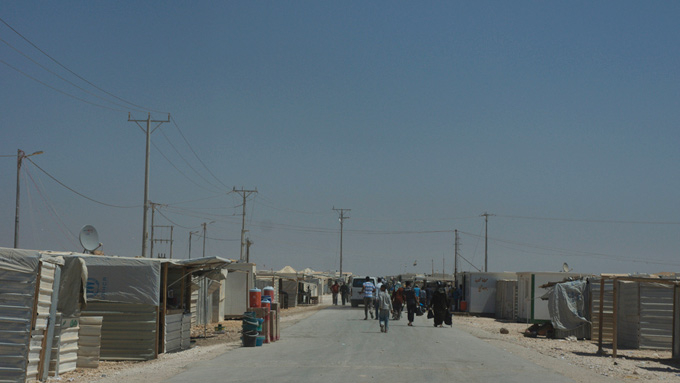
Al-Zaatari refugee camp in Jordan, near the Syrian border. Photo by MTL, August 2013.
For Suheir’s sister, the measurable distance between the Palestinian experience and the Syrian one collapsed when she started working as an aid provider at Zaatari refugee camp. She saw how in less than two years the residents of the camp founded a community buzzing with trade—vegetable markets, cybercafes, salons, tailors and currency exchanges—and she thought, “This is how it happens, how time passes.” She saw the endless lines of people waiting for the tents distributed by United Nations High Commission for Refugees and thought about how her family was similarly given a tent. And when she heard how people made it out of Syria, why they left and what they had to do to get to Zaatari, then, for the first time, she understood what her family had gone through and what they are still dealing with.
Palestine as a Prefigurative State
Today the experience of the Palestinian refugee acts as a point of departure for the Syrian refugee. It’s not that this connection has been seen only from the Palestinian side but rather that the Syrians in Zaatari are likewise reflecting on the Palestinian experience. They are preparing for the long haul by pointing to the Palestinians. They recognize the political game and the great powers at play, from Iran and Russia to Saudi Arabia, Israel and the United States. They know that their lives are now abstractions. They know that numbers of the dead matter, that how you get killed matters and that who kills you definitely matters. All this determines your chances of being saved or at least helped. The displaced Syrians know that as refugees they must patiently wait, because geopolitical calculations transcend the values of human life and justice. The Palestinian experience clarifies that much, and Syrians know it, even as the specificities of each struggle remain nontransferable. The constant across their struggles is that people are merely “collateral damage” for powerful states, especially now, as they remap the weaker nations that surround them.
What life has been like for Palestinians since 1948 is what it is
becoming for so many in the region and in the world.
So we return to Palestine not simply as a personal preoccupation but to use its situation as a compass directing our understanding of other experiences. Why is Palestine so resonant? The entire Middle East and the world’s powerless live under varying forms of occupation. Some are refugees; others are seeking refuge from being a refugee. Palestinians are not living in a “state of exception.” It is, rather, a prefigurative state. What life has been like for Palestinians since 1948 is what it is becoming for so many in the region and in the world.
As we unpack the term refugee, we should also ask what its converse, citizen, really means. Where and what is Syria? What is Palestine? Before Hassan Hassan, a Palestinian refugee, was tortured to death by the Syrian regime, he said, “All that I know is Palestine is the refugee camp, and the camp is part and parcel of Palestine.” Detroit, with its unelected “emergency manager,” has become an internal colony of the United States, marked by “the border.” Ukraine is undertaking a revolution that may free it from a neo-feudal relationship to Russia only to result in neoliberal subjection to the European Union. It has been too simple for too long to say that we are all refugees, that we are all human and that we demand human rights. Are we really all refugees? If so, we must ask ourselves how are we implicated in what’s happening. How do we perpetuate our own oppression? How do we position ourselves in relation to other struggles? Wherever we live, as “refugees” or “citizens,” it is time to locate ourselves as cohabitants shaping a common environment, a home without borders.
This piece, commissioned by Creative Time Reports, has also been published by Alternet.

